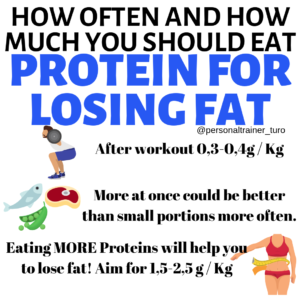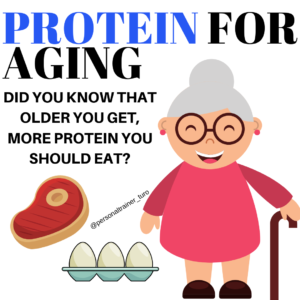What is the best protein – How much protein you need to eat?
If you missed part 1, read it here
After years controlling and seeing how my clients eat and what is one of the biggest struggles they have, I wanted to share my thoughts with evidence based facts in this 2/2 part blog text.
Quality of protein is IMPORTANT
Many people look only how much protein they are eating and not thinking about the quality of protein.
There are big differences in a protein´s quality and depending quality of protein is determine how much your body can use it.
There is no need to say that higher quality protein you eat, more easily your body is able to repair, grow and maintain your body.
There are two factors where you can compare if protein is high or low quality:
Digestibility and amino acid composition.
Your high-quality protein sources
Top sources are:
- Dairy products; milk, whey powders, cheese and cottage cheese, yogurt
- Eggs
- Seafood and fish
- Beef
- Chicken
- Bison
- Pork
- Pea Protein
- Soybeans
- Blended meals (beans and rice)
- Vegan protein powders with multiple protein sources
Like you see from best sources, they are almost all animal sources. So if you choose not to eat animal products, you’ll have to work a little harder to get more protein from a wide variety of plant sources to make up the difference and meet your protein needs.
How Often and how much you should eat proteins?
After workout:
It is recommended that you should eat 0,3-0,4g /Kg at once after your workout. So for example person who weight 75kg, should eat 22-30g after workout . More protein you eat, it is indeed more likely that your body is able to absorb protein. Obviously no need to overreact.
More at once could be better than small portions more often.
There is some research what is supporting this claim. It is better to eat at least 20g at once. For this reason if woman who weight 60 kilos and she is trying to lose fat. Her goal is to eat 90g of protein / day and if you divide that for 6 meals it is only 15g per meal. It is not much and would make more sense to eat for example 30g at once and 3x in the day. This way it is more likely that you body is able to absorb proteins and turn on muscle protein synthesis, which is key for building and repairing muscle tissue.
How much protein is recommended for special groups and scenarios
Protein for Athletes
Active people and athletes should eat more protein. At the moment there is no exact number how much and current recommendations vary from 1,2-2.2g/kg of body weight.
My recommendation is between 1,5-2,0g /kg
Protein for aging
Important to realize is older you get, you will start to lose bone and muscle mass. This affects how long and healthy life you have.
New research shows that most older people, particularly women over 65, need more protein than the current recommendations to slow down muscle loss.
Experts now recommend over 2.0 g/kg of body weight for people older than 65.

Protein for losing fat
Eating MORE Proteins will help you to lose fat! Important to realize is that when you eat more protein, you will feel fuller longer.
Another key point is that Protein makes your body work to digest it. Your body will use part of of energy from proteins to heat -producing. It means that if you eat 100 Calories of protein, you will use only about 70 calories of it.
Particularly if you are on significant caloric deficit, protein helps you to maintain on lean mass when you are losing fat. Once your body doesn´t get energy it would need, it will use all available energy from fat, muscle, bone etc. Unfortunately you will lose only some muscles and not only fat unless you eat lots of protein.
Protein for building muscle
The more protein in your muscles, the bigger and stronger your muscles can get.
You have an anabolic window (24-48h) after a workout during which muscles are especially greedy for amino acids.
So, if you’d like to build muscle, make sure you eat a protein-rich meal within a few hours after training. Important is quality of protein and it seems that a fast-digesting animal protein supplement (whey) is better at getting your body to make more muscle compared to plant-based protein (soy). Of course, you can also just eat “real food” after working out.
Many bodybuilders eat over 4g/ Kg but it seems that there is no advance of eating “high protein” 2-3g / Kg.
It was a long text, if you made it until the end. Congratulations, you know a lot from proteins.
Sources and credits: Precision Nutrition (https://www.precisionnutrition.com/will-a-high-protein-diet-harm-your-health) , Juha Hulmi; Lihastohtori (2015)

